News
🎓Congratulations on successfully graduating with a doctorate – with honors! 🏅
We would like to congratulate Morten Schierholz on passing the oral examination of his doctoral thesis entitled: Methods of Machine Learning for Analysis and Decoupling of Power Delivery Networks on Printed Circuit Boards with distinction. With a great deal of commitment, scientific depth and a strong contribution to power integrity (PI), Mr. Schierholz not only passed the examination, but was also awarded a grade of honors – a special recognition for an outstanding achievement. We are proud to be able to support such young scientists at the Hamburg University of Technology and look forward to everything that is yet to come professionally and scientifically! Pictured from left to right: Prof. Markus Stiemer, Morten Schierholz, Prof. Christian Schuster and Prof. Gerhard Bauch
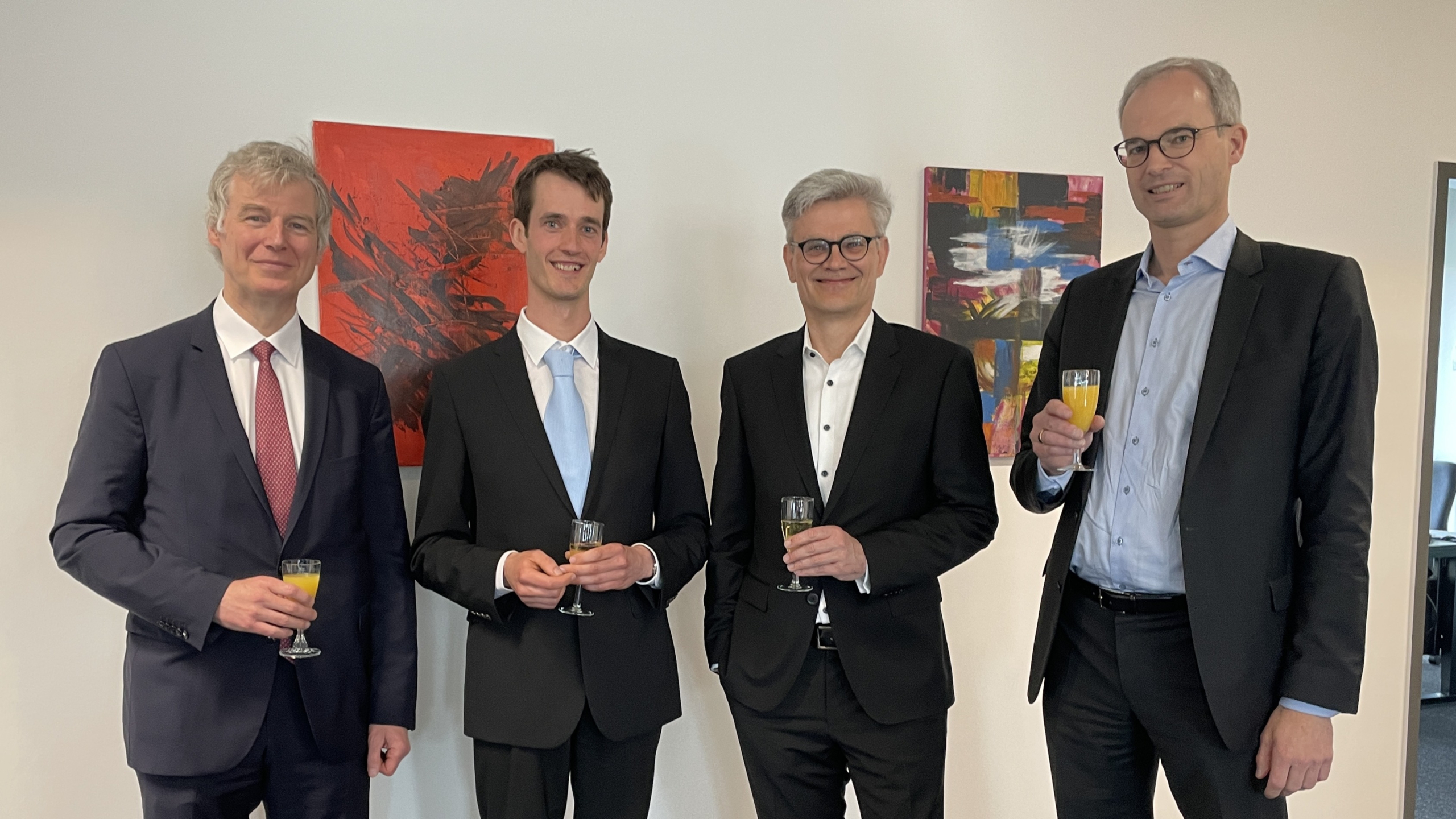
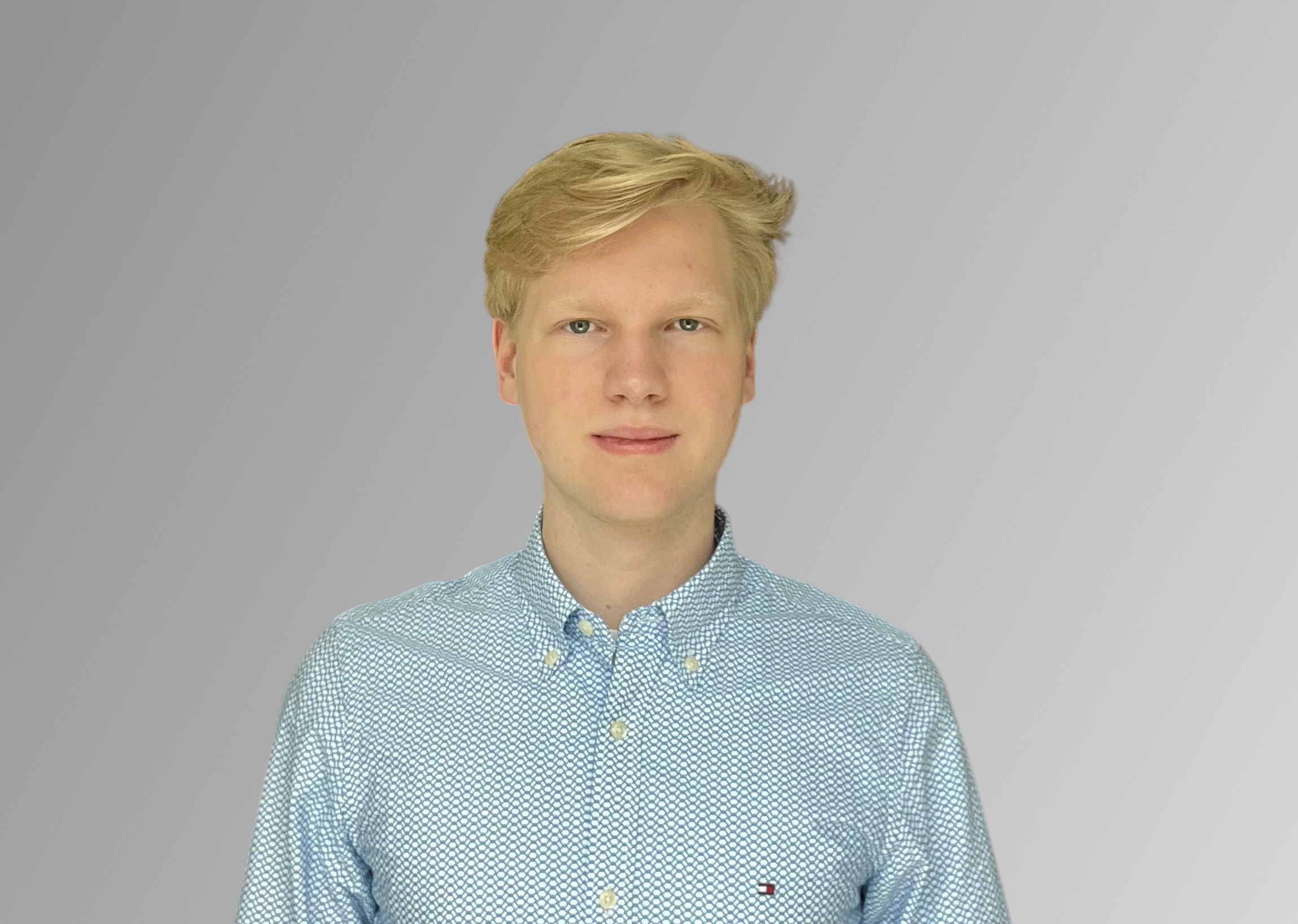
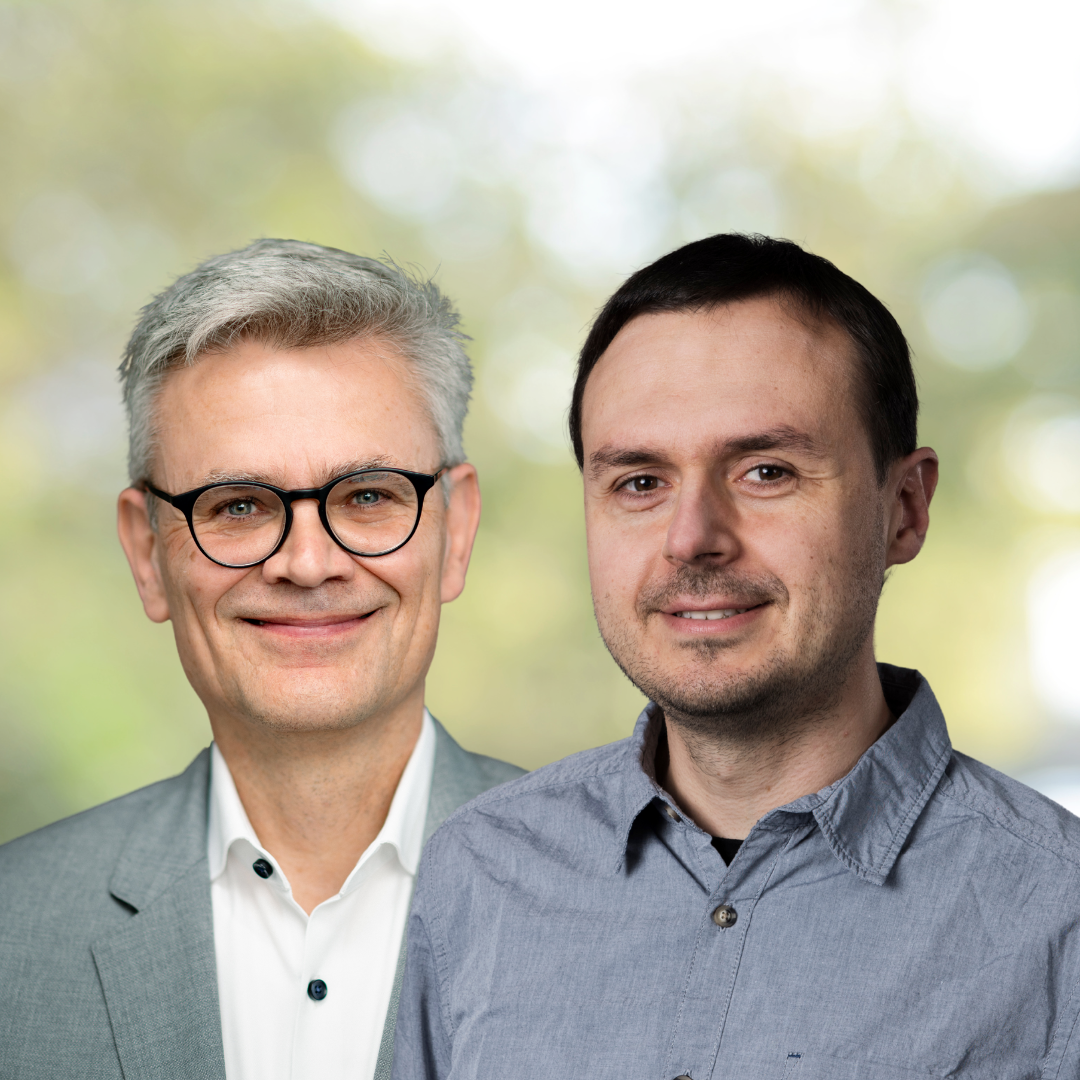
TUHH Press Release:
European Doctoral Network “Enabling Artificial Intelligence for Electromagnetic Compatibility” – DN PATTERN 💡
The Hamburg University of Technology (TUHH) is proud to be part of a newly established Horizon Europe Marie Skłodowska-Curie Doctoral Network addressing a highly relevant topic: the application of artificial intelligence (AI) to ensure electromagnetic compatibility (EMC) in medical devices.
Congratulations to Prof Christian Schuster (Institut für Theoretische Elektrotechnik) and Prof. Matthias Mnich (TUHH Institute for Algorithms and Complexity), who are leading the DN PATTERN project at TUHH. 👏 Coordinated by Eindhoven University of Technology, the MSCA Doctoral Network DN PATTERN brings together expertise from AI, EMC, medical technology, risk management, and sustainability management.
The network unites 9 universities from 7 countries and 11 industry partners to train 16 PhD students in AI-driven product development. TUHH will host 2 of these positions, focusing on machine learning and data-driven EMC prediction for the development of safe and sustainable medical devices.
👉 Read more about the project
Modeling for EMC: From Physics to AI – Keynote by Prof. Christian Schuster at APEMC 2025 (sponsored by the IEEE EMC Society)⚡
We are excited to announce that Prof. Christian Schuster will be a keynote speaker at APEMC 2025, taking place from May 19-23 in Taipei, Taiwan. His talk will address a fundamental question:
📌 How does AI-driven modeling transform the design, testing, and optimization of EMC, Signal Integrity, and Power Integrity?
In his keynote, Prof. Schuster will explore this topic in depth. At Hamburg University of Technology (TUHH), we have collaborated with partners to compare traditional physics-based modeling with AI-driven, data-based approaches – and to examine their potential for EMC engineering. A special highlight will be the outlook on the European Doctoral Network DN PATTERN, which focuses on integrating Artificial Intelligence into EMC research. We look forward to insightful discussions at APEMC 2025 and to shaping the future of electromagnetic compatibility together. See you in Taipei! 🚀
We are excited to host two insightful Distinguished Lectures on May 15, 2025, co-organized by the IEEE EMC Society EMC German Chapter. These DL talks will cover both near-field and far-field testing, featuring leading specialists in artificial intelligence(AI), antenna measurement, and electromagnetic compatibility (EMC).
Date: Thursday, May 15, 2025
Time: 15:00 – 17:00 (3:00 – 5:00 p.m. UTC+2, Berlin Time)
Venue: Wissenschaftliches Kommunikationszentrum (Wikom, Room 0053/54, Building I), Denickestraße 22, 21073 Hamburg, Germany


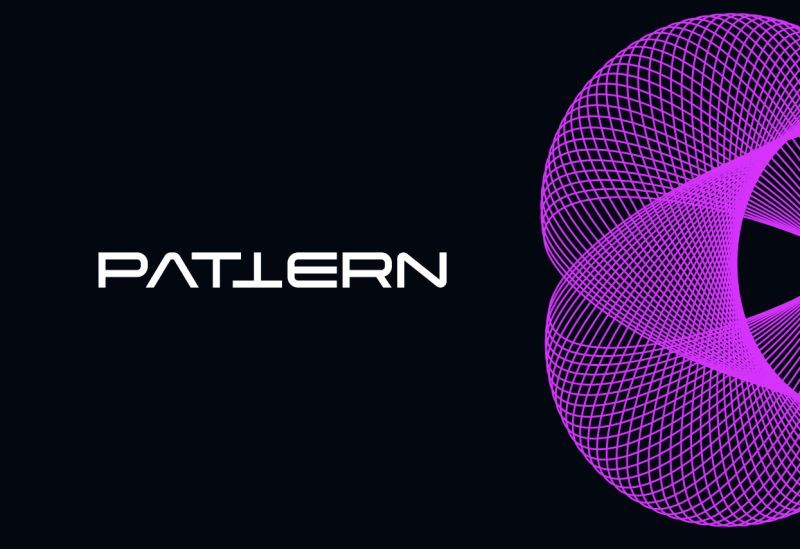
🚀 Research Associate Position at the Institut für Theoretische Elektrotechnik 🚀
Are you passionate about the intersection of Artificial Intelligence and Electromagnetic Compatibility? This is your opportunity to join an exciting research project! We are hiring a Research Associate (m/f/d) at the Institut für Theoretische Elektrotechnik as part of the EU-funded DN PATTERN (Marie Skłodowska-Curie Actions). In collaboration with Prof. Mnich (Institute Institute for Algorithms and Complexity) and ROSENBERGER.
Topic: Automation of the Assessment of Physics-Based vs. Data-Based Approaches for Signal Integrity (SI) and Electromagnetic Interference (EMI) Prediction and Optimization of Cables and Connectors Assemblies.
💡 More info & application
🚀 Exciting PhD Opportunity at the Institut für Theoretische Elektrotechnik! 🚀
Are you passionate about Machine Learning, Electrical Engineering, or Physics? We are offering a PhD position as part of the EU-funded DN PATTERN project (Marie Skłodowska-Curie Actions) [https://pattern-dn.eu]! In collaboration with Prof. Mnich (Institute Institute for Algorithms and Complexity) and Nexperia.
🔹 Topic: AI-driven simulation and optimization for electromagnetic compatibility
🔹 International research with secondments at Nexperia (Germany) & IETR – Institut d’Electronique et des Technologies du numéRique – UMR CNRS 6164 (France)
🔹 Attractive salary (TV-L E13) & full funding within a European research network
📅 Application deadline: March 31, 2025
📍 Start date: June 2, 2025
💡 More info & application

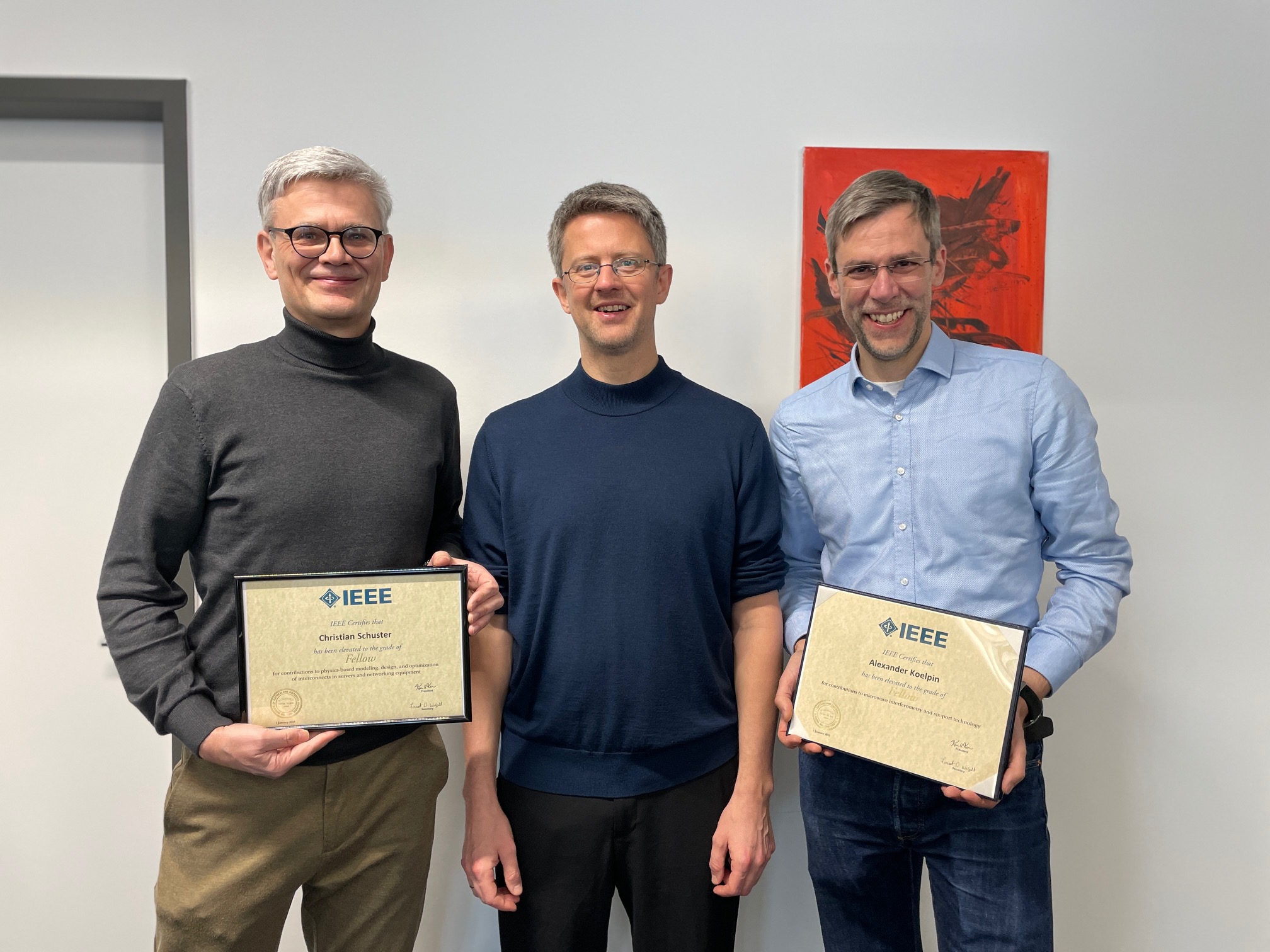
12.02.2025: Leading International Engineering Association Honors Prof. Alexander Koelpin and Prof. Christian Schuster as IEEE Fellows. At the beginning of the year, Prof. Dr. Alexander Kölpin from the Institute of High-Frequency Technology and Prof. Dr. Christian Schuster from the Institute für Theoretische Elektrotechnik at Hamburg University of Technology (TUHH) were honored by the IEEE professional association for their outstanding scientific achievements. The two new Fellows celebrated their success on February 12, 2025, together with colleagues from the Faculty of Electrical Engineering, Computer Science, and Mathematics. We extend our heartfelt congratulations to both of them!
The photo shows Prof. Christian Schuster (left) and Prof. Alexander Kölpin (right) with the Dean of Studies Prof. Daniel Ruprecht (center).
28.01. – 31.01.2025: We are thrilled to share that the Institut für Theoretische Elektrotechnik (TET) at Hamburg University of Technology (TUHH) and our esteemed partners had a fantastic presence at this years DesignCon 2025! We had the honor of presenting two research papers, during the oral sessions, contributing valuable insights to the field of high-speed PCB design:
🔹Prediction of Dielectric Constant and Copper Roughness Parameters of High-Speed Automotive PCB Digital Interconnects Using a Data-Based Model – exploring machine learning modeling techniques for improved automotive interconnect design. By Jose Enrique Hernandez Bonilla (Bosch), Golzar Alavi (Bosch), Torsten Reuschel (University of New Brunswick), Cheng Yang (TUHH) and Christian Schuster (TUHH).
🔹 Impedance Profile Prediction and Classification for PCB-Based PDN Decoupling Using Autoencoders – leveraging machine learning for efficient power distribution network optimization. By Youcef Hassab (TUHH), Jan Heßling (TUHH), Morten Schierholz, Jayaprakash Balachandran (dMatrix), Ihsan Erdin (Celestica), and Christian Schuster (TUHH).
The photo shows Youcef Hassab (left) and Jan Hessling (right).
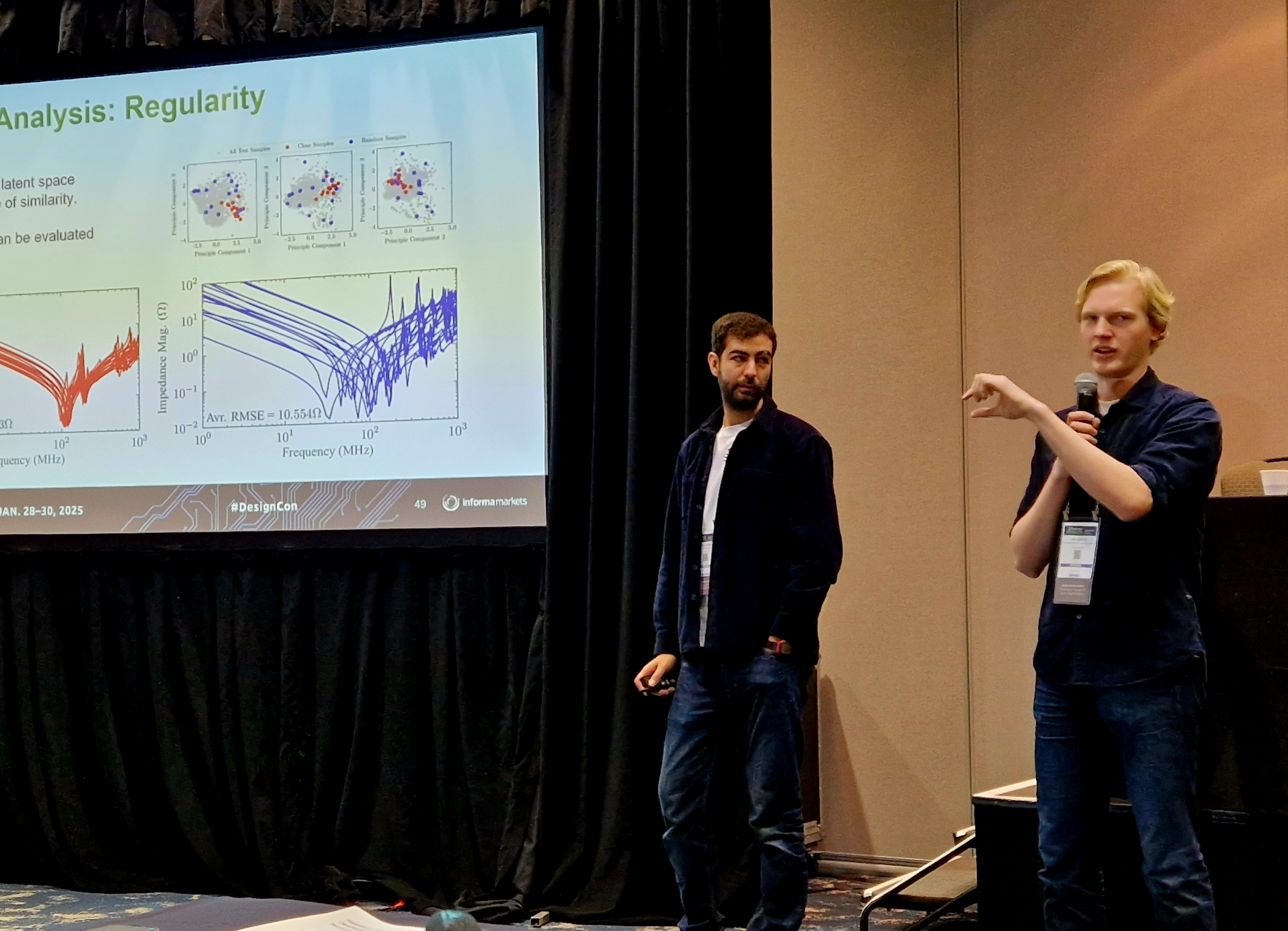
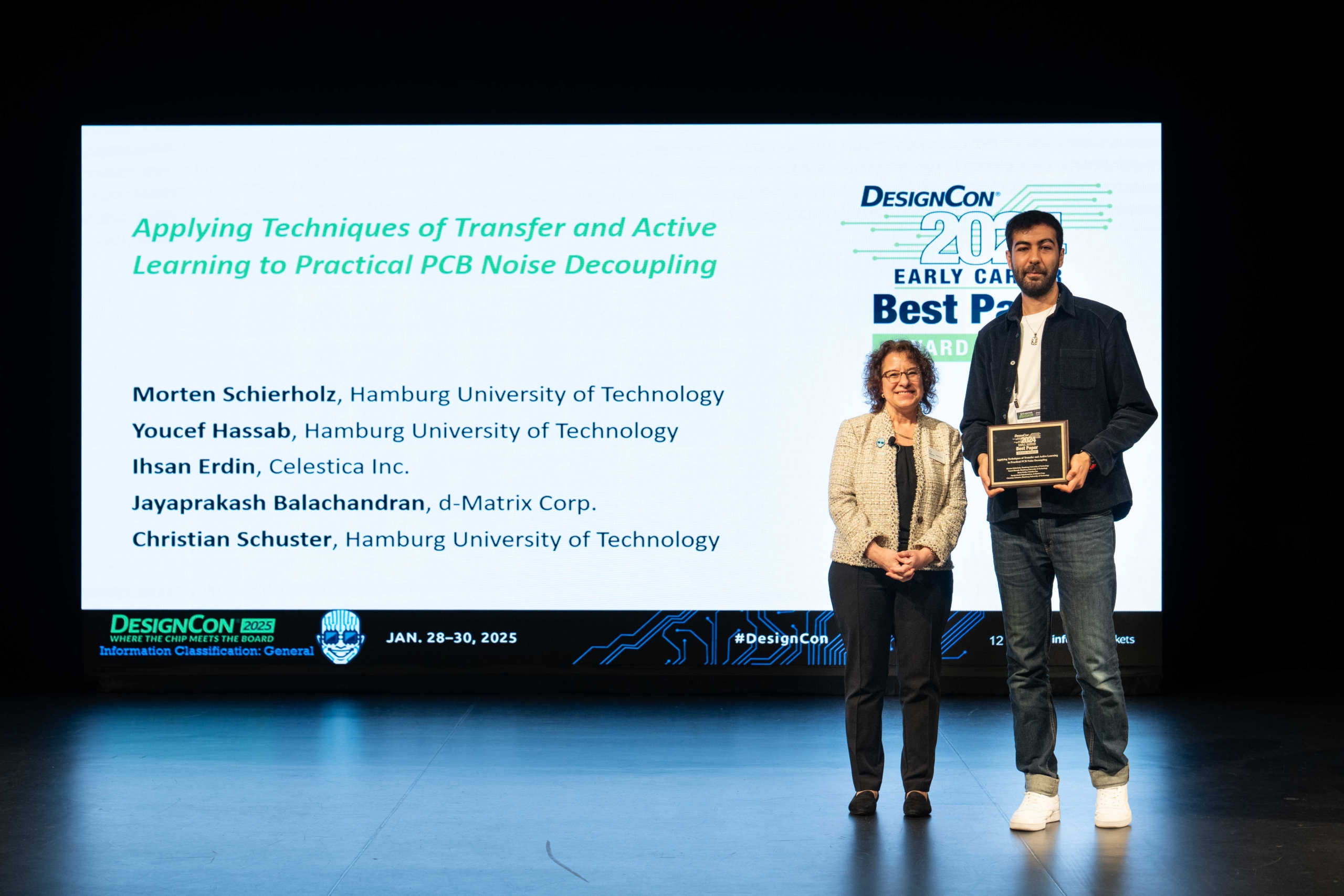
29.01.2025: At DesignCon 2025 in January this year, Mr. Yousef Hassab had the honor of accepting the DesignCon 2024 Early-Career BPA winning paper on behalf of all contributors. In January 2024, Mr. Youcef Hassab (TUHH), together with Mr. Morten Schierholz, Ihsan Erdin (Celestica Inc.), Jayaprakash Balachandran (d-Matrix), and Christian Schuster, received the DesignCon 2024 Early-Career Best Paper Award for the conference paper “Applying Techniques of Transfer & Active Learning to Practical PCB Noise Decoupling.” In the photo, Mr. Hassab can be seen accepting the award at the ceremony.
20.12.2024: The Institut für Theoretische Elektrotechnik hosted Dr.-Ing. Thomas Fiedler, Project Leader of the Electromagnetic Simulations and RF Safety Group at the Division of Medical Physics in Radiology, German Cancer Research Center (DKFZ German Cancer Research Center), for an insightful presentation on MRI Safety at 7 Tesla and Beyond. Dr. Fiedler’s presentation covered the electromagnetic fields used in MRI and the associated patient safety risks. He also introduced methods for optimizing the RF transmit field using multi-channel RF transmission systems and real-time SAR monitoring techniques. Following the talk, we had the opportunity to exchange ideas on our recent work, including full-wave numerical SAR prediction using machine learning presented by M. Sc. Hamideh Esmaeili. We also showcased, firstly under the water, our high-speed, high-resolution near-field measurement capabilities. Thank you Dr. Fiedler, we are excited for future collaborations and challenges in advancing MRI technologies! The picture shows from left to right: Dr. Cheng Yang, Dr. Thomas Fiedler and Hamideh Esmaeili
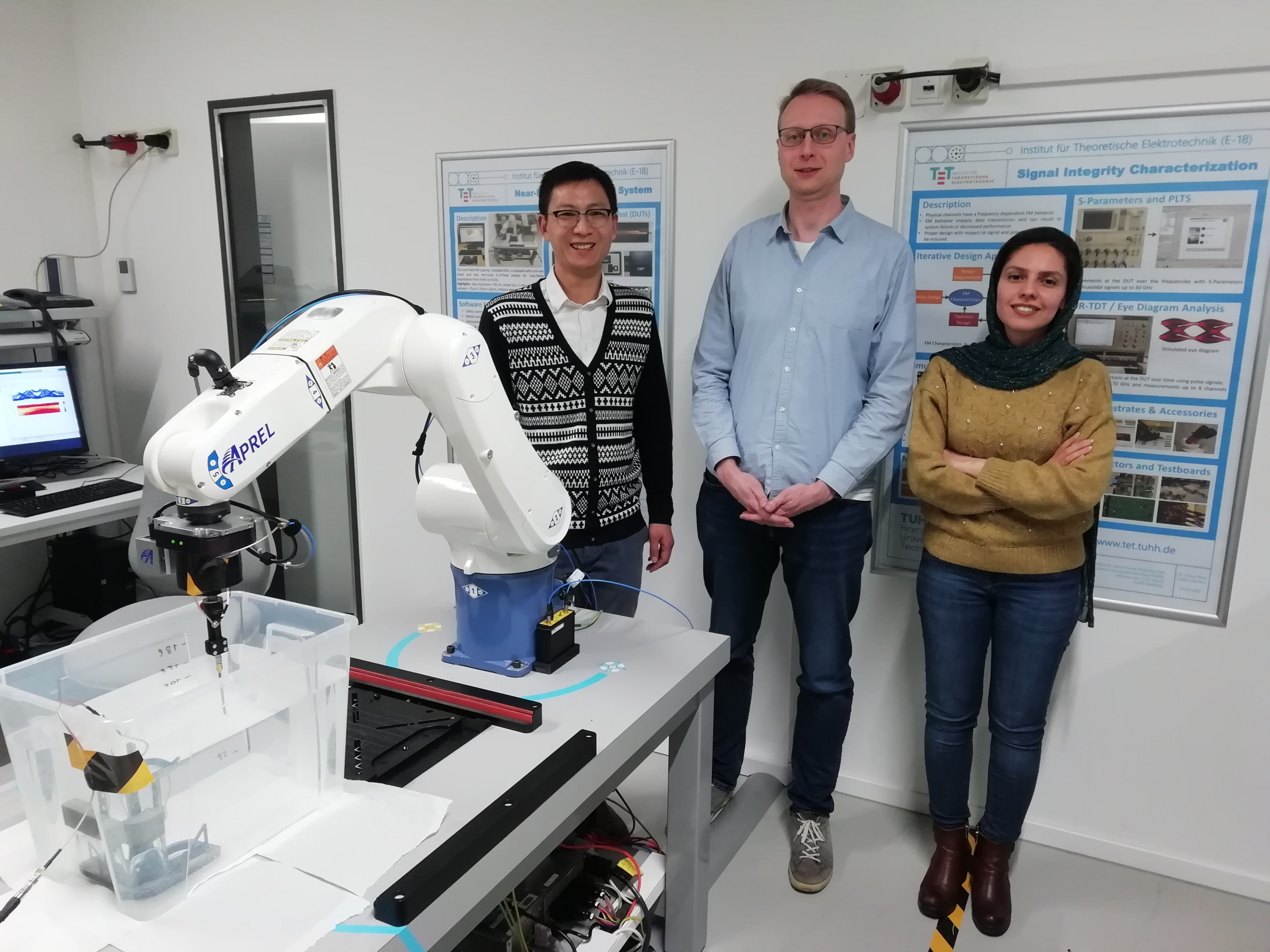
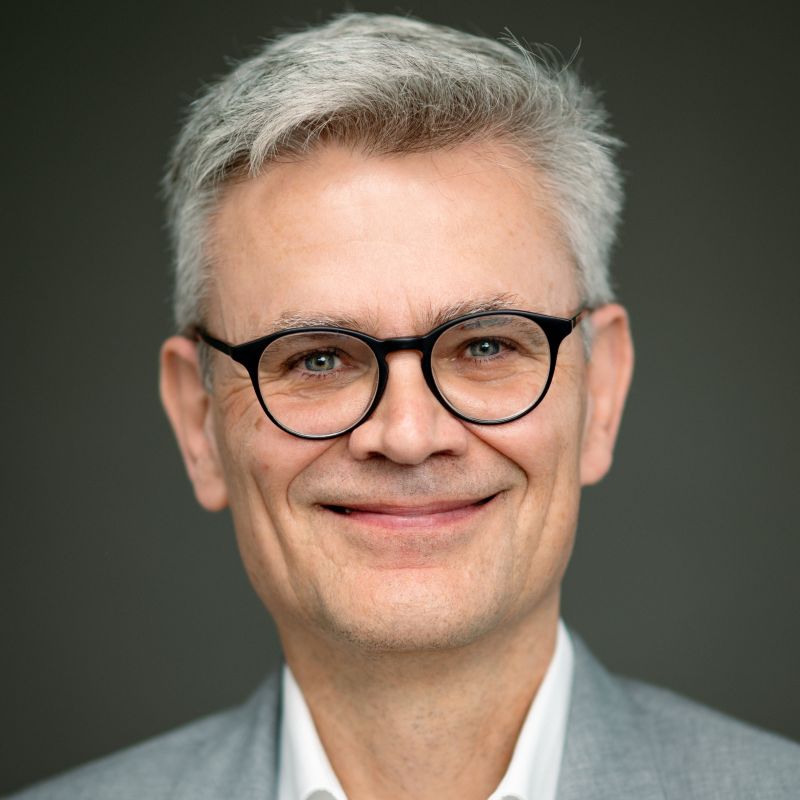
27.11.2024: We are honored and delighted to announce that the IEEE Board of Directors, at its November 2024 meeting, has elevated Prof. Schuster to the status of IEEE Fellow, effective January 1, 2025, with the following citation:
For contributions to physics-based modeling, design, and optimization of interconnects in servers and networking equipment.
Special thanks are extended to his nominator, Prof. James Drewniak, for his invaluable guidance and encouragement, to the exceptional members of the IEEE EMC Society, and to Hamburg University of Technology, which has supported Prof. Schuster’s research for over 18 years.

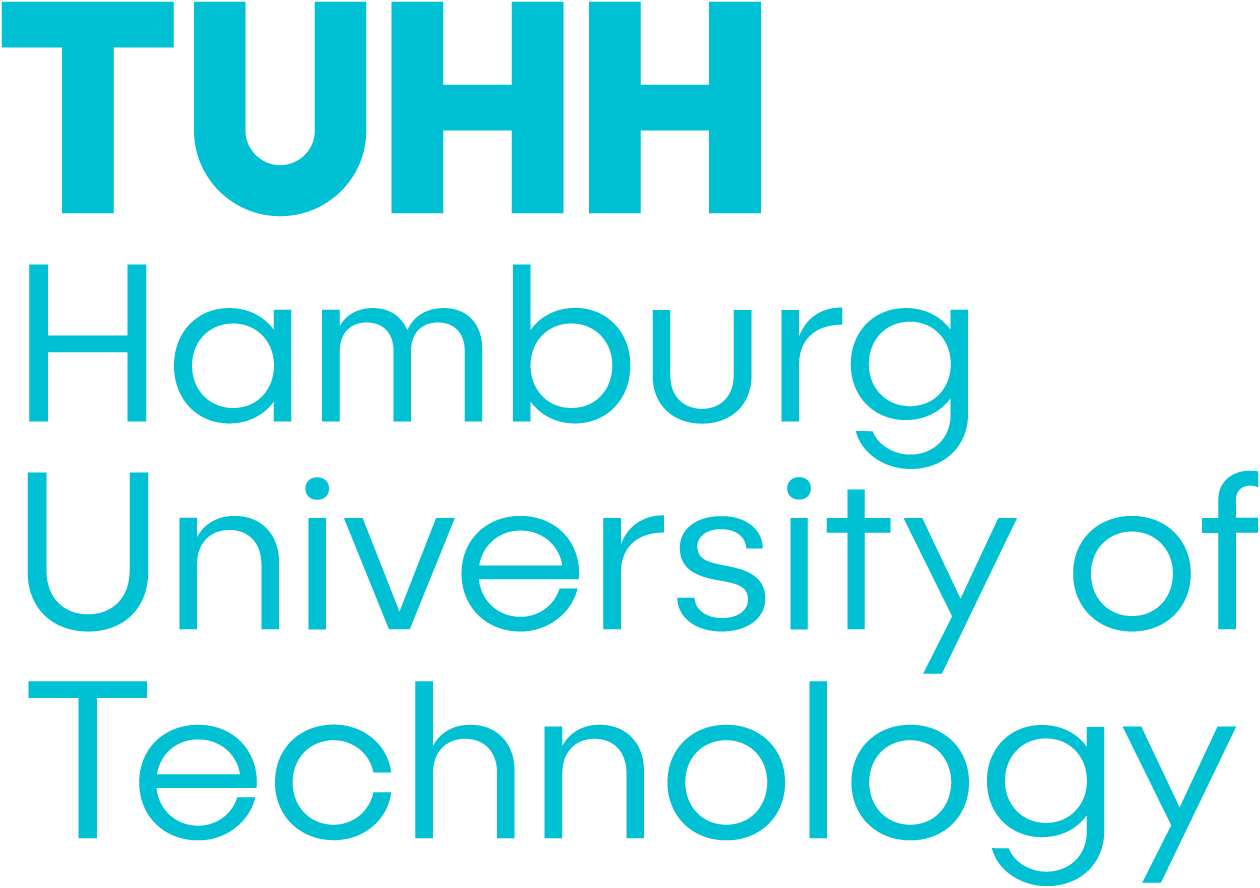
We’re thrilled to welcome Mr. Jan Heßling as a new research associate at our Institut für Theoretische Elektrotechnik (TET)!
Over the next four years, he will be conducting research on the topic “Characterization of PCB-based Interconnects using Machine Learning”
– a super exciting field where we hope to make great strides together.
Welcome aboard the TET team – we’re looking forward to working with you! 🚀